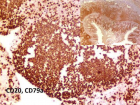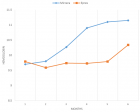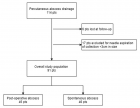Abstract
Research Article
Effectiveness of levocetirizine in treating allergic rhinitis while retaining work efficiency
Dabholkar Yogesh, Shah Tanush, Rathod Roheet, Paspulate Akhila, Veligandla Krishna Chaitanya, Rathod Rahul, Devesh Kumar Joshi* and Kotak Bhavesh
Published: 25 April, 2023 | Volume 7 - Issue 1 | Pages: 005-011
The manifestation and severity of Allergic rhinitis symptoms show diurnal variation which negatively impacts the patient’s quality of life, day-to-day activities, and productivity at the workplace. The symptoms worsen at night or early morning and therefore administration of levocetirizine towards evening may be more acceptable. Consequently, the present study evaluated the effectiveness of evening Levocetirizine administration on 24-hour symptom control, Physical and mental health, and daytime somnolence in patients with allergic rhinitis the study was a prospective, open-labeled, single-arm, two-center, observational study among patients with allergic rhinitis. Levocetirizine was prescribed as 5 mg or 10 mg once a day evening oral dose for at least 7 days before sleep. The 24-hour total nasal symptom scores (TNSS) for self-reported signs and symptoms of allergic rhinitis were recorded. Additionally, study evaluations included the SF-12 scale (Quality of Life), Stanford Sleepiness Scale (degree of sleepiness), and work productivity and activity impairment (WPAI) questionnaires. These evaluations were performed at baseline (Day 0) and at scheduled intervals of Day 1 (24-hour), Day 3, and Day 7. Results demonstrated that evening administration of Levocetirizine facilitates 24-hour symptom control while having no significant effect on daytime somnolence, daily activities, and the work productivity of patients.
Read Full Article HTML DOI: 10.29328/journal.aaai.1001031 Cite this Article Read Full Article PDF
Keywords:
Levocetirizine; Allergic rhinitis; Antihistaminics; Quality of life; Chrono-pharmacology
References
- Wheatley LM, Togias A. Clinical practice. Allergic rhinitis. N Engl J Med. 2015 Jan 29;372(5):456-63. doi: 10.1056/NEJMcp1412282. PMID: 25629743; PMCID: PMC4324099.
- Skoner DP. Allergic rhinitis: definition, epidemiology, pathophysiology, detection, and diagnosis. J Allergy Clin Immunol. 2001 Jul;108(1 Suppl):S2-8. doi: 10.1067/mai.2001.115569. PMID: 11449200.
- Tran NP, Vickery J, Blaiss MS. Management of rhinitis: allergic and non-allergic. Allergy Asthma Immunol Res. 2011 Jul;3(3):148-56. doi: 10.4168/aair.2011.3.3.148. Epub 2011 May 20. PMID: 21738880; PMCID: PMC3121056.
- Kawauchi H, Yanai K, Wang DY, Itahashi K, Okubo K. Antihistamines for Allergic Rhinitis Treatment from the Viewpoint of Nonsedative Properties. Int J Mol Sci. 2019 Jan 8;20(1):213. doi: 10.3390/ijms20010213. PMID: 30626077; PMCID: PMC6337346.
- Canonica GW, Blaiss M. Antihistaminic, anti-inflammatory, and antiallergic properties of the nonsedating second-generation antihistamine desloratadine: a review of the evidence. World Allergy Organ J. 2011 Feb;4(2):47-53. doi: 10.1097/WOX.0b013e3182093e19. Epub 2011 Feb 23. PMID: 23268457; PMCID: PMC3500039.
- Rao S, Pai S, Vaidya KA, Shanbhag TV. Efficacy, safety and cost effectiveness of Levocetirizine and ebastine in allergic rhinitis: a comparative study. International Journal of Basic & Clinical Pharmacology. 2018; 7(9): 1748–1751.
- Church MK, Church DS. Pharmacology of antihistamines. Indian J Dermatol. 2013 May;58(3):219-24. doi: 10.4103/0019-5154.110832. PMID: 23723474; PMCID: PMC3667286.
- Godse K, Jain A, Pharande P. Comparative Efficacy Of Fexofenadine And Levocetirizine In Chronic Idiopathic Urticaria Indian J Dermatol. 2007;52(4):212.
- Walsh GM. The anti-inflammatory effects of levocetirizine--are they clinically relevant or just an interesting additional effect? Allergy Asthma Clin Immunol. 2009 Dec 17;5(1):14. doi: 10.1186/1710-1492-5-14. PMID: 20066054; PMCID: PMC2804563.
- Nettis E, Calogiuri GF, Di Leo E, Cardinale F, Macchia L, Ferrannini A, Vacca A. Once daily levocetirizine for the treatment of allergic rhinitis and chronic idiopathic urticaria. J Asthma Allergy. 2008 Dec 16;2:17-23. doi: 10.2147/jaa.s3022. PMID: 21437140; PMCID: PMC3048603.
- Snidvongs K, Seresirikachorn K, Khattiyawittayakun L, Chitsuthipakorn W. Sedative Effects of Levocetirizine: A Systematic Review and Meta-Analysis of Randomized Controlled Studies. Drugs. 2017 Feb;77(2):175-186. doi: 10.1007/s40265-016-0682-0. PMID: 28070872.
- Smolensky MH, Lemmer B, Reinberg AE. Chronobiology and chronotherapy of allergic rhinitis and bronchial asthma. Adv Drug Deliv Rev. 2007 Aug 31;59(9-10):852-82. doi: 10.1016/j.addr.2007.08.016. Epub 2007 Aug 17. PMID: 17900748.
- Singh-Franco D, Ghin HL, Robles GI, Borja-Hart N, Perez A. Levocetirizine for The Treatment Of Allergic Rhinitis And Chronic Idiopathic Urticaria In Adults And Children. Clin Ther. 2009;31(8):1664-1687.
- Ware J Jr, Kosinski M, Keller SD. A 12-Item Short-Form Health Survey: construction of scales and preliminary tests of reliability and validity. Med Care. 1996 Mar;34(3):220-33. doi: 10.1097/00005650-199603000-00003. PMID: 8628042.
- Hoddes E, Dement W, Zarcone V. The Development and Use of The Stanford Sleepiness Scale (SSS). Psychophysiology. 1972; 9: 150.
- Reilly MC, Zbrozek AS, Dukes EM. The validity and reproducibility of a work productivity and activity impairment instrument. Pharmacoeconomics. 1993 Nov;4(5):353-65. doi: 10.2165/00019053-199304050-00006. PMID: 10146874.
- de la Hoz Caballer B, Rodríguez M, Fraj J, Cerecedo I, Antolín-Amérigo D, Colás C. Allergic rhinitis and its impact on work productivity in primary care practice and a comparison with other common diseases: the Cross-sectional study to evAluate work Productivity in allergic Rhinitis compared with other common dIseases (CAPRI) study. Am J Rhinol Allergy. 2012 Sep-Oct;26(5):390-4. doi: 10.2500/ajra.2012.26.3799. PMID: 23168153; PMCID: PMC3904041.
- Skoner DP. Allergic rhinitis: definition, epidemiology, pathophysiology, detection, and diagnosis. J Allergy Clin Immunol. 2001 Jul;108(1 Suppl):S2-8. doi: 10.1067/mai.2001.115569. PMID: 11449200.
- Wang XY, Lim-Jurado M, Prepageran N, Tantilipikorn P, Wang de Y. Treatment of allergic rhinitis and urticaria: a review of the newest antihistamine drug bilastine. Ther Clin Risk Manag. 2016 Apr 13;12:585-97. doi: 10.2147/TCRM.S105189. PMID: 27110120; PMCID: PMC4835134.
- Bachert C, Bousquet J, Canonica GW, Durham SR, Klimek L, Mullol J, Van Cauwenberge PB, Van Hammée G; XPERT Study Group. Levocetirizine improves quality of life and reduces costs in long-term management of persistent allergic rhinitis. J Allergy Clin Immunol. 2004 Oct;114(4):838-44. doi: 10.1016/j.jaci.2004.05.070. PMID: 15480324.
- Rogkakou A, Villa E and Garelli V, Canonica GW. Persistent Allergic Rhinitis and the XPERT Study. WAO Journal • March 2011, Supplement Allergic Rhinitis and The XPERT Study. Ann Allergy Asthma Immunol. B-ENT. 2006;2(2):55-62.
- Stuck BA, Czajowski J, Hagner AE, Klimek L, Verse T, Hörmann K, Maurer JT. Changes in Daytime Sleepiness, Quality Of Life, And Objective Sleep Patterns In Seasonal Allergic Rhinitis: A Controlled Clinical Trial. J Allergy Clin Immunol. 2004;113:663–8.
- Crystal-Peters J, Crown WH, Goetzel RZ, Schutt DC. The cost of productivity losses associated with allergic rhinitis. Am J Manag Care. 2000 Mar;6(3):373-8. PMID: 10977437.
- Jorissen M, Bertrand B, Stiels B, Vandenbulcke K. Levocetirizine as treatment for symptoms of seasonal allergic rhinitis. B-ENT. 2006;2(2):55-62. PMID: 16910288.
- Vanitha M, Sowmini K, Kumari SS, Reddy RN. Efficacy of Oral Bilastine in Comparison with Levocetirizine in Allergic Rhinitis A Randomised Clinical study. Journal of Clinical and Diagnostic Research. 2021 ;15(8): FC01-FC0
- Segall N, Gawchik S, Georges G, Haeusler JM. Efficacy and safety of levocetirizine in improving symptoms and health-related quality of life in US adults with seasonal allergic rhinitis: a randomized, placebo-controlled study. Ann Allergy Asthma Immunol. 2010 Mar;104(3):259-67. doi: 10.1016/j.anai.2009.12.003. PMID: 20377116.
- Tzanetos DB, Fahrenholz JM, Scott T, Buchholz K. Comparison of the sedating effects of levocetirizine and cetirizine: a randomized, double-blind, placebo-controlled trial. Ann Allergy Asthma Immunol. 2011 Dec;107(6):517-22. doi: 10.1016/j.anai.2011.08.012. Epub 2011 Sep 19. PMID: 22123381.
- Suchita, Sharma DK, Kaur G, Singh A, Bhagat S, Matreja PS. Comparison of safety, effectiveness and cost effectiveness of Combination of Levocetirizine and Fexofenadine with Montelukast in Allergic Rhinitis and its effect on Quality of Life. International Archives of BioMedical and Clinical Research. 2020; 6(2): 5-8.
Similar Articles
-
Atopic Conjunctivitis in Children: Influence of Treatment with Topical Cyclosporin 0.05% in the Quality of LifeCarlos Alberto Sánchez Salguero*,Álvaro Isidro Sánchez Chacón. Atopic Conjunctivitis in Children: Influence of Treatment with Topical Cyclosporin 0.05% in the Quality of Life . . 2017 doi: 10.29328/journal.haard.1001001; 1: 001-008
-
The use of Allergoids and Adjuvants in Allergen ImmunotherapyCelso Eduardo Olivier*. The use of Allergoids and Adjuvants in Allergen Immunotherapy. . 2017 doi: 10.29328/journal.haard.1001006; 1: 040-060
-
HIV-1 Immune evasion: The main obstacle toward a successful vaccineAmitis Ramezani*,Mona Sadat Larijani,Seyed Mehdi Sadat. HIV-1 Immune evasion: The main obstacle toward a successful vaccine . . 2018 doi: 10.29328/journal.aaai.1001013; 2: 013-015
-
Allergic Asthma and Sick building syndromeSeyyed Shamsadin Athari*. Allergic Asthma and Sick building syndrome . . 2019 doi: 10.29328/journal.aaai.1001015; 3: 001-002
-
Immune system and quality of life following aerobic exercise versus resistance exercise training among Alzheimer’sFadwah M Al-Sharif*. Immune system and quality of life following aerobic exercise versus resistance exercise training among Alzheimer’s. . 2020 doi: 10.29328/journal.aaai.1001018; 4: 003-008
-
Effectiveness of levocetirizine in treating allergic rhinitis while retaining work efficiencyDabholkar Yogesh, Shah Tanush, Rathod Roheet, Paspulate Akhila, Veligandla Krishna Chaitanya, Rathod Rahul, Devesh Kumar Joshi*, Kotak Bhavesh. Effectiveness of levocetirizine in treating allergic rhinitis while retaining work efficiency. . 2023 doi: 10.29328/journal.aaai.1001031; 7: 005-011
-
Efficacy and Safety of Sublingual Immunotherapy using a Combination of Dermatophagoides Pteronyssinus and Blomia Tropicalis Extracts in Patients with Allergic Rhinitis: A Randomized, Double-Blind, Placebo-Controlled TrialPriscilla Rios Cordeiro Macedo, Priscila Moraes, Luisa Karla Arruda, Fábio Fernandes Morato Castro, Jorge Kalil, Clóvis Eduardo Santos Galvão*. Efficacy and Safety of Sublingual Immunotherapy using a Combination of Dermatophagoides Pteronyssinus and Blomia Tropicalis Extracts in Patients with Allergic Rhinitis: A Randomized, Double-Blind, Placebo-Controlled Trial. . 2023 doi: 10.29328/journal.aaai.1001033; 7: 023-031
Recently Viewed
-
Drinking-water Quality Assessment in Selective Schools from the Mount LebanonWalaa Diab, Mona Farhat, Marwa Rammal, Chaden Moussa Haidar*, Ali Yaacoub, Alaa Hamzeh. Drinking-water Quality Assessment in Selective Schools from the Mount Lebanon. Ann Civil Environ Eng. 2024: doi: 10.29328/journal.acee.1001061; 8: 018-024
-
Rapid Microbial Growth in Reusable Drinking Water BottlesQishan Liu*,Hongjun Liu. Rapid Microbial Growth in Reusable Drinking Water Bottles. Ann Civil Environ Eng. 2017: doi: 10.29328/journal.acee.1001007; 1: 055-062
-
Beneficial effects of a ketogenic diet in a woman with Charcot-Marie-Tooth diseaseElvira Rostanzo,Anna Maria Aloisi*. Beneficial effects of a ketogenic diet in a woman with Charcot-Marie-Tooth disease. Arch Food Nutr Sci. 2022: doi: 10.29328/journal.afns.1001040; 6: 068-072
-
Isolation and Influence of Carbon Source on the Production of Extracellular Polymeric Substance by Bacteria for the Bioremediation of Heavy Metals in Santo Amaro CityLeila Thaise Santana de Oliveira Santos*, Kayque Frota Sampaio, Elisa Esposito, Elinalva Maciel Paulo, Aristóteles Góes-Neto, Amanda da Silva Souza, Taise Bomfim de Jesus. Isolation and Influence of Carbon Source on the Production of Extracellular Polymeric Substance by Bacteria for the Bioremediation of Heavy Metals in Santo Amaro City. Ann Civil Environ Eng. 2024: doi: 10.29328/journal.acee.1001060; 8: 012-017
-
Management and use of Ash in Britain from the Prehistoric to the Present: Some implications for its PreservationJim Pratt*. Management and use of Ash in Britain from the Prehistoric to the Present: Some implications for its Preservation. Ann Civil Environ Eng. 2024: doi: 10.29328/journal.acee.1001059; 8: 001-011
Most Viewed
-
Evaluation of Biostimulants Based on Recovered Protein Hydrolysates from Animal By-products as Plant Growth EnhancersH Pérez-Aguilar*, M Lacruz-Asaro, F Arán-Ais. Evaluation of Biostimulants Based on Recovered Protein Hydrolysates from Animal By-products as Plant Growth Enhancers. J Plant Sci Phytopathol. 2023 doi: 10.29328/journal.jpsp.1001104; 7: 042-047
-
Sinonasal Myxoma Extending into the Orbit in a 4-Year Old: A Case PresentationJulian A Purrinos*, Ramzi Younis. Sinonasal Myxoma Extending into the Orbit in a 4-Year Old: A Case Presentation. Arch Case Rep. 2024 doi: 10.29328/journal.acr.1001099; 8: 075-077
-
Feasibility study of magnetic sensing for detecting single-neuron action potentialsDenis Tonini,Kai Wu,Renata Saha,Jian-Ping Wang*. Feasibility study of magnetic sensing for detecting single-neuron action potentials. Ann Biomed Sci Eng. 2022 doi: 10.29328/journal.abse.1001018; 6: 019-029
-
Pediatric Dysgerminoma: Unveiling a Rare Ovarian TumorFaten Limaiem*, Khalil Saffar, Ahmed Halouani. Pediatric Dysgerminoma: Unveiling a Rare Ovarian Tumor. Arch Case Rep. 2024 doi: 10.29328/journal.acr.1001087; 8: 010-013
-
Physical activity can change the physiological and psychological circumstances during COVID-19 pandemic: A narrative reviewKhashayar Maroufi*. Physical activity can change the physiological and psychological circumstances during COVID-19 pandemic: A narrative review. J Sports Med Ther. 2021 doi: 10.29328/journal.jsmt.1001051; 6: 001-007

HSPI: We're glad you're here. Please click "create a new Query" if you are a new visitor to our website and need further information from us.
If you are already a member of our network and need to keep track of any developments regarding a question you have already submitted, click "take me to my Query."




















































































































































